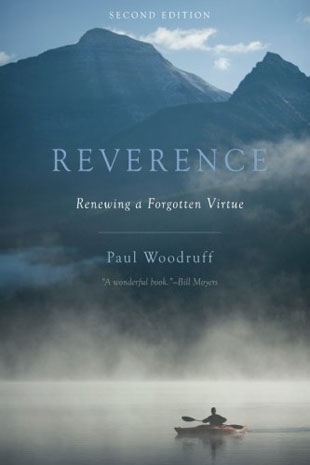Paul Woodruff is Mary Helen Thompson Professor of the Humanities at the University of Texas in Austin. A widely published translator of Plato, Thucydides, and other ancient writers, he has written four previous books on classical philosophy and political thought. In this eloquent and uplifting volume, he offers a thoughtful and highly ethical overview of reverence which he sees as "an ancient virtue that survives among us in half forgotten patterns of civility, in moments of inarticulate awe, and in nostalgia for the lost ways of traditional cultures." The modern world seems to be more interested in the mockery of irreverence; mention the word "solemnity" today and you will probably hear snickering in the background. But Woodruff is convinced that the ancients had it right by emphasizing the humanizing virtues of reverence in rituals and ceremonies.
The author begins with a quick look at places where reverence seems to be missing: in homes where family members seldom have time for one another, in political campaigns where many citizens do not vote, and in sports where a simple modicum of respect for the rules of the game seems to have vanished. The incivility of our culture is evident in the rash of reports about angry parents who have assaulted umpires at local sports events. "Reverence," states Woodruff "lies behind civility and all of the graces that make life in society bearable and pleasant."
The author provides concrete illustrations how this ancient virtue, cherished by the ancient Greeks and Chinese, enhances life: in the performance of a Mozart string quartet, in the informal ceremony of a group of students for a dead friend, in a classroom where a teacher demonstrates a deep respect for knowledge, and in a home where small rituals link family members together in life-affirming ways. Woodruff believes that reverence connects religious traditions; those who operate from different faith perspectives still share a sense of awe in the face of mystery and a recognition of human limitations.
In the following passage, Woodruff hits high stride: "Reverence has more to do with politics than with religion. We can easily imagine religion without reverence; we see it, for example, wherever religion leads people into aggressive war or violence, But power without reverence--that is a catastrophe for all concerned. Power without reverence is aflame with arrogance, while service without reverence is smoldering toward rebellion. Politics without reverence is blind to the general good and deaf to the advice from people who are powerless. And life without reverence? Entirely without reverence? That would be brutish and selfish, and it had best be lived alone."
It is high time for us to renew this forgotten virtue and to begin practicing it in our daily lives. Woodruff urges us to respect the rights of others and cherish the glories of the natural world. He suggests that we pay more attention to silence, rituals that express meaning, and art that conveys the imponderables of life.
